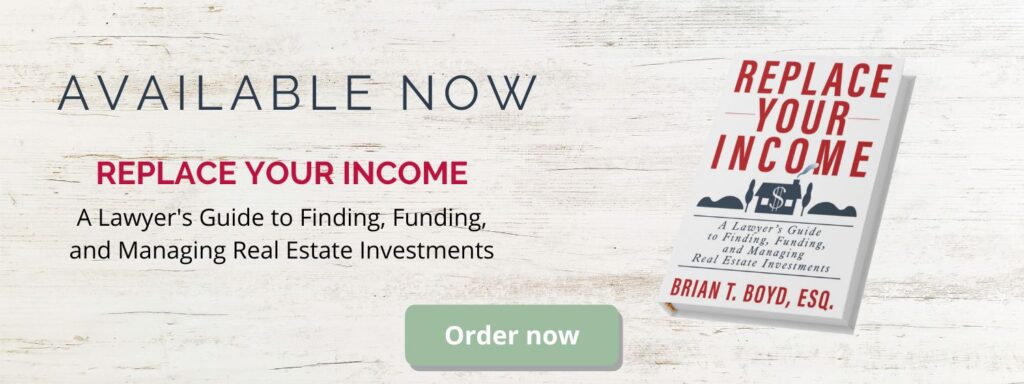Wondering how to invest in real estate? Since the first step in real estate investing is deciding that you want to, if you’re at that point, you’ve made progress toward your goal. Congratulations!
I’m sure your next question is, “So what do I do next?”
Of course, as an attorney, my response is going to be, “It depends.” However, I will help you make the best decision for yourself. My intent isn’t to give you a specific, one-size-fits-all path to follow, but to help you decide which direction to go in that makes the most sense for you.
One of my clients, let’s call him Dr. K, decided to get into real estate investing with his wife to replace his current income so he doesn’t have to work as many hours, to create generational wealth, and to take advantage of the tax benefits associated with real estate.
Dr. K bought two small houses to hold as long-term rentals and is living in one right now while his new house is being built. By buying rental properties, Dr. K can take advantage of the real estate tax benefits to lessen his tax bill each year. Investing in rental real estate has enabled Dr. K to increase his cash flow, reduce his taxable income, and create an asset that pays him every month while it grows in value.
Starting on this path to real estate ownership and investing has opened possibilities not previously available to Dr. K. He and his wife are preparing to leverage their equity in those two properties to buy their first short-term cabin rental, to create greater cash flow. The short-term rentals will generate more profit in a shorter amount of time for Dr. K. Within two years, he and his wife will have grown their portfolio to three rental properties. The couple is on their way to replacing the wife’s income within five years at the current rate they are growing!
However, you should have a few things in place before you jump into investing of any kind.
3 things you need before investing in real estate
1. Good credit score
At a minimum, your credit score should be at 650 or higher. The more you can explain any drops in your score, such as for student loans, the better. Even better would be a 700. Moreover, if there is something on your credit that is incorrect, clear that up by contacting the three credit bureaus to report any inaccuracies.
2. Good debt-to-income (DTI) ratio
Another is a good debt-to-income (DTI) ratio. If you’re early-career, that may be harder to achieve, given a starting salary and student loans, for example. Your monthly expenses may account for 60% or 70% of your income, which is too high to qualify for most mortgages and leaves little in the way of disposable income to set aside.
3. Down payment
There’s a final piece you need to have: funds saved for a down payment on a property.
A 20% down payment is widely considered ideal, but that isn’t realistic for every buyer. Traditionally, a mortgage down payment is at least 5% of a home’s sale price. Don’t use all your savings for a down payment. You should really only put down a percentage of what you have saved, because unexpected crises are inevitably going to come up, and you want to be prepared.
Once you have a good credit score, you’ve paid down a good bit of your debt, and you have money for a down payment, you can start making decisions about where to invest those funds.
Your first decision is whether to pursue commercial or residential real estate investing. While they are both types of real estate investing, they are very different in how you operate the properties.
This content is excerpted from Replace Your Income: A Lawyer’s Guide to Finding, Funding, and Managing Real Estate Investments.

